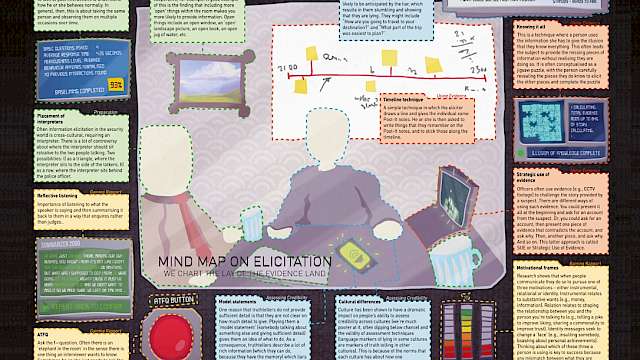Paul Taylor
CREST Outputs
Projects
Articles
Academic Publications
Facilitating recall and particularisation of repeated events in adults using a multi-method interviewing format
Reports about repeated experiences tend to include more schematic information than information about specific instances. However, investigators in both forensic and intelligence settings typically seek specific over general information. We tested a multi-method interviewing format (MMIF) to facilitate recall and particularisation of repeated events through the use of the self-generated cues mnemonic, the timeline technique, and follow-up questions. Over separate sessions, 150 adult participants watched four scripted films depicting a series of meetings in which a terrorist group planned attacks and planted explosive devices. For half of our sample, the third witnessed event included two deviations (one new detail and one changed detail). A week later, participants provided their account using the MMIF, the timeline technique with self-generated cues, or a free recall format followed by open-ended questions. As expected, more information was reported overall in the MMIF condition compared to the other format conditions, for two types of details, correct details, and correct gist details. The reporting of internal intrusions was comparable across format conditions. Contrary to hypotheses, the presence of deviations did not benefit recall or source monitoring. Our findings have implications for information elicitation in applied settings and for future research on adults’ retrieval of repeated events.
(From the journal abstract)
Kontogianni, F., Rubinova, E., Hope, L., Taylor, P. J., Vrij, A., & Gabbert, F. (2021). Facilitating recall and particularisation of repeated events in adults using a multi-method interviewing format. Memory, 29(4), 471–485.
https://doi.org/10.1080/09658211.2021.1903508Behavioral consistency in the digital age
Efforts to infer personality from digital footprints have focused on behavioral stability at the trait level without considering situational dependency. We repeat Shoda, Mischel, and Wright’s (1994) classic study of intraindividual consistency with data on 28,692 days of smartphone usage by 780 people. Using per app measures of ‘pickup’ frequency and usage duration, we found that profiles of daily smartphone usage were significantly more consistent when taken from the same user than from different users (d > 1.46). Random forest models trained on 6 days of behavior identified each of the 780 users in test data with 35.8% / 38.5% (pickup / duration) accuracy. This increased to 73.5% / 75.3% when success was taken as the user appearing in the top 10 predictions (i.e., top 1%). Thus, situation-dependent stability in behavior is present in our digital lives and its uniqueness provides both opportunities and risks to privacy.
(From the journal abstract)
Shaw, H., Taylor, P., Ellis, D. A., & Conchie, S. (2021). Behavioral consistency in the digital age [Preprint]. PsyArXiv.
https://doi.org/10.31234/osf.io/r5wtnLanguage Style Matching : A Comprehensive List of Articles and Tools
Language style matching (LSM) is a technique in behavioural analytics which assess the stylistic similarities in language use across groups and individuals. The procedure targets the similarity of functions words, analysing the way people use language rather than the content. Function words consist of pronouns, articles, conjunctions, prepositions, auxiliary verbs e.t.c. which have a syntactical role in language. To assess the similarity of language use between interlocutors, the percentage of function words used can be compared within and across conversations using a metric designed to calculate the matching of specific word categories and overall LSM (Ireland et al., 2011) . It is also possible to assess language style matching to a group’s aggregate style. High language style matching is an indicator of interpersonal and group mimicry and has been shown to influence psychological factors and behavioural outcomes. These are listed in this preprint and categorised by topic. The list aims to be a complete summary of the existing literature to date exploring LSM. Therefore, please email the author if there are any projects and tools not listed below.
Shaw, H., Taylor, P., Conchie, S., & David Alexander Ellis, D. (2019, Mar 6). Language Style Matching: A Comprehensive List of Articles and Tools
https://doi.org/10.31234/osf.io/yz4br‘Language of lies’: Urgent issues and prospects in verbal lie detection research
Since its introduction into the field of deception detection, the verbal channel has become a rapidly growing area of research. The basic assumption is that liars differ from truth tellers in their verbal behaviour, making it possible to classify them by inspecting their verbal accounts. However, as noted in conferences and in private communication between researchers, the field of verbal lie detection faces several challenges that merit focused attention. The first author therefore proposed a workshop with the mission of promoting solutions for urgent issues in the field. Nine researchers and three practitioners with experience in credibility assessments gathered for 3 days of discussion at Bar-Ilan University (Israel) in the first international verbal lie detection workshop. The primary session of the workshop took place the morning of the first day. In this session, each of the participants had up to 10 min to deliver a brief message, using just one slide. Researchers were asked to answer the question: ‘In your view, what is the most urgent, unsolved question/issue in verbal lie detection?’ Similarly, practitioners were asked: ‘As a practitioner, what question/issue do you wish verbal lie detection research would address?’ The issues raised served as the basis for the discussions that were held throughout the workshop. The current paper first presents the urgent, unsolved issues raised by the workshop group members in the main session, followed by a message to researchers in the field, designed to deliver the insights, decisions, and conclusions resulting from the discussions.
Nahari, G., Ashkenazi, T., Fisher, R. P., Granhag, P. A., Hershkovitz, I., Masip, J., Meijer, E., Nisin, Z., Sarid, N., Taylor, P. J., Verschuere, B., & Vrij, A. (2019). Language of Lies: Urgent issues and prospects in verbal lie detection research. Legal and Criminological Psychology, 24, 1-23.
https://doi.org/10.1111/lcrp.12148Cultural differences in the efficacy of unexpected questions, sketching, and timeline methods in eliciting cues to deception
Asking unexpected questions, asking the interviewee to sketch the room, and asking the interviewee to make a timeline are techniques that have been shown to help an interviewer detect deceit. However, evidence of the efficacy of these techniques comes from studies of North American and North-West European participants, who are on average more individualistic (i.e., value individual achievements and uniqueness over group achievements) than people from other parts of the world. In two experiments involving participants with individualistic and collectivistic cultural backgrounds, we provide a more culturally diverse test of these techniques. Specifically, this study describes two experiments that investigated these interviewing techniques with people who are recent migrants to the UK. Experiment 1 used the LIWC categories “I,” “we,” “cognitive processes,” and “social processes” as the dependent variables; Experiment 2 measured details provided in a sketch and a timeline. The results show no effects of veracity in either of these experiments, although various effects of cultural differences in the outcome variables were observed. This suggests that cues to deception may not necessarily generalize to people from different cultural backgrounds. These results highlight the importance of conducting lie detection research across different countries and cultures.
(From the journal abstract)
Tache, I., Warmelink, L., Taylor, P. & Hope, L. (2023) Cultural differences in the efficacy of unexpected questions, sketching, and timeline methods in eliciting cues to deception, Frontiers in Psychology. 14:1175333. doi:10.3389/fpsyg.2023.117533
https://www.frontiersin.org/articles/10.3389/fpsyg.2023.1175333/full
Projects
Articles
Academic Publications
Facilitating recall and particularisation of repeated events in adults using a multi-method interviewing format
Reports about repeated experiences tend to include more schematic information than information about specific instances. However, investigators in both forensic and intelligence settings typically seek specific over general information. We tested a multi-method interviewing format (MMIF) to facilitate recall and particularisation of repeated events through the use of the self-generated cues mnemonic, the timeline technique, and follow-up questions. Over separate sessions, 150 adult participants watched four scripted films depicting a series of meetings in which a terrorist group planned attacks and planted explosive devices. For half of our sample, the third witnessed event included two deviations (one new detail and one changed detail). A week later, participants provided their account using the MMIF, the timeline technique with self-generated cues, or a free recall format followed by open-ended questions. As expected, more information was reported overall in the MMIF condition compared to the other format conditions, for two types of details, correct details, and correct gist details. The reporting of internal intrusions was comparable across format conditions. Contrary to hypotheses, the presence of deviations did not benefit recall or source monitoring. Our findings have implications for information elicitation in applied settings and for future research on adults’ retrieval of repeated events.
(From the journal abstract)
Kontogianni, F., Rubinova, E., Hope, L., Taylor, P. J., Vrij, A., & Gabbert, F. (2021). Facilitating recall and particularisation of repeated events in adults using a multi-method interviewing format. Memory, 29(4), 471–485.
Behavioral consistency in the digital age
Efforts to infer personality from digital footprints have focused on behavioral stability at the trait level without considering situational dependency. We repeat Shoda, Mischel, and Wright’s (1994) classic study of intraindividual consistency with data on 28,692 days of smartphone usage by 780 people. Using per app measures of ‘pickup’ frequency and usage duration, we found that profiles of daily smartphone usage were significantly more consistent when taken from the same user than from different users (d > 1.46). Random forest models trained on 6 days of behavior identified each of the 780 users in test data with 35.8% / 38.5% (pickup / duration) accuracy. This increased to 73.5% / 75.3% when success was taken as the user appearing in the top 10 predictions (i.e., top 1%). Thus, situation-dependent stability in behavior is present in our digital lives and its uniqueness provides both opportunities and risks to privacy.
(From the journal abstract)
Shaw, H., Taylor, P., Ellis, D. A., & Conchie, S. (2021). Behavioral consistency in the digital age [Preprint]. PsyArXiv.
Language Style Matching : A Comprehensive List of Articles and Tools
Language style matching (LSM) is a technique in behavioural analytics which assess the stylistic similarities in language use across groups and individuals. The procedure targets the similarity of functions words, analysing the way people use language rather than the content. Function words consist of pronouns, articles, conjunctions, prepositions, auxiliary verbs e.t.c. which have a syntactical role in language. To assess the similarity of language use between interlocutors, the percentage of function words used can be compared within and across conversations using a metric designed to calculate the matching of specific word categories and overall LSM (Ireland et al., 2011) . It is also possible to assess language style matching to a group’s aggregate style. High language style matching is an indicator of interpersonal and group mimicry and has been shown to influence psychological factors and behavioural outcomes. These are listed in this preprint and categorised by topic. The list aims to be a complete summary of the existing literature to date exploring LSM. Therefore, please email the author if there are any projects and tools not listed below.
Shaw, H., Taylor, P., Conchie, S., & David Alexander Ellis, D. (2019, Mar 6). Language Style Matching: A Comprehensive List of Articles and Tools
‘Language of lies’: Urgent issues and prospects in verbal lie detection research
Since its introduction into the field of deception detection, the verbal channel has become a rapidly growing area of research. The basic assumption is that liars differ from truth tellers in their verbal behaviour, making it possible to classify them by inspecting their verbal accounts. However, as noted in conferences and in private communication between researchers, the field of verbal lie detection faces several challenges that merit focused attention. The first author therefore proposed a workshop with the mission of promoting solutions for urgent issues in the field. Nine researchers and three practitioners with experience in credibility assessments gathered for 3 days of discussion at Bar-Ilan University (Israel) in the first international verbal lie detection workshop. The primary session of the workshop took place the morning of the first day. In this session, each of the participants had up to 10 min to deliver a brief message, using just one slide. Researchers were asked to answer the question: ‘In your view, what is the most urgent, unsolved question/issue in verbal lie detection?’ Similarly, practitioners were asked: ‘As a practitioner, what question/issue do you wish verbal lie detection research would address?’ The issues raised served as the basis for the discussions that were held throughout the workshop. The current paper first presents the urgent, unsolved issues raised by the workshop group members in the main session, followed by a message to researchers in the field, designed to deliver the insights, decisions, and conclusions resulting from the discussions.
Nahari, G., Ashkenazi, T., Fisher, R. P., Granhag, P. A., Hershkovitz, I., Masip, J., Meijer, E., Nisin, Z., Sarid, N., Taylor, P. J., Verschuere, B., & Vrij, A. (2019). Language of Lies: Urgent issues and prospects in verbal lie detection research. Legal and Criminological Psychology, 24, 1-23.
Cultural differences in the efficacy of unexpected questions, sketching, and timeline methods in eliciting cues to deception
Asking unexpected questions, asking the interviewee to sketch the room, and asking the interviewee to make a timeline are techniques that have been shown to help an interviewer detect deceit. However, evidence of the efficacy of these techniques comes from studies of North American and North-West European participants, who are on average more individualistic (i.e., value individual achievements and uniqueness over group achievements) than people from other parts of the world. In two experiments involving participants with individualistic and collectivistic cultural backgrounds, we provide a more culturally diverse test of these techniques. Specifically, this study describes two experiments that investigated these interviewing techniques with people who are recent migrants to the UK. Experiment 1 used the LIWC categories “I,” “we,” “cognitive processes,” and “social processes” as the dependent variables; Experiment 2 measured details provided in a sketch and a timeline. The results show no effects of veracity in either of these experiments, although various effects of cultural differences in the outcome variables were observed. This suggests that cues to deception may not necessarily generalize to people from different cultural backgrounds. These results highlight the importance of conducting lie detection research across different countries and cultures.
(From the journal abstract)
Tache, I., Warmelink, L., Taylor, P. & Hope, L. (2023) Cultural differences in the efficacy of unexpected questions, sketching, and timeline methods in eliciting cues to deception, Frontiers in Psychology. 14:1175333. doi:10.3389/fpsyg.2023.117533










